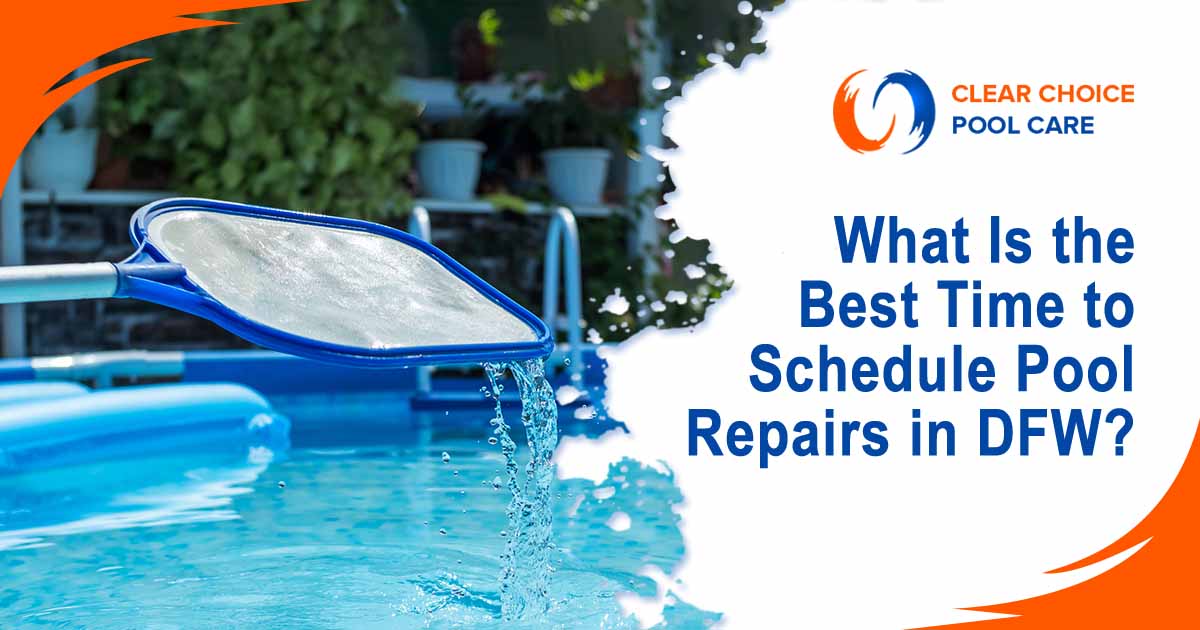Keeping a pool in good condition requires regular maintenance and timely repairs. Pool owners in the Dallas-Fort Worth (DFW) area must consider seasonal factors, pool usage, and repair costs when scheduling service. Choosing the right time for pool repairs can prevent long-term damage, reduce expenses, and ensure the pool is ready for use when needed.
Understanding the best time for pool repairs in DFW helps residential and commercial pool owners make informed decisions. This guide outlines key factors to consider, seasonal recommendations, and tips for choosing professional pool repair services.
Understanding the Importance of Timely Pool Repairs
Pool repairs should not be delayed. Even minor issues can worsen, leading to higher costs and potential safety risks. Regular inspections and prompt repairs help extend the lifespan of the pool and its equipment.
Why Pool Repairs Are Essential for Longevity and Safety
Proper maintenance and timely repairs prevent common pool problems such as leaks, cracks, and equipment failures. Addressing these issues early reduces the risk of costly replacements and ensures the pool remains safe.
Common Issues That Require Prompt Attention
Several pool problems require immediate repair to prevent further damage:
- Leaks – Water loss can lead to structural damage and increased utility costs.
- Pump and filter malfunctions – Faulty equipment affects water circulation and cleanliness.
- Cracks and surface damage – Pool surfaces can deteriorate, leading to leaks and unsafe conditions.
- Chemical imbalances – Poor water chemistry can cause corrosion, algae growth, and health hazards.
Regular maintenance and timely repairs ensure pools remain in top condition throughout the year. Scheduling service at the right time can help pool owners avoid unexpected disruptions and costly repairs.
Factors That Affect the Best Time for Pool Repairs in DFW
Several factors influence the best time to schedule pool repairs in DFW. Weather conditions, pool usage patterns, and technician availability all impact when repairs should be completed. Understanding these factors helps pool owners plan maintenance effectively.
Weather Conditions and Seasonal Considerations
DFW experiences extreme weather variations throughout the year. Pool repairs should be scheduled based on seasonal conditions to ensure efficiency and prevent additional damage.
- Spring and fall are ideal for most repairs, as moderate temperatures allow for smooth work completion.
- Summer is the busiest time for pool use, making it difficult to schedule repairs without disrupting swimming activities.
- Winter is often the most cost-effective repair time, as demand for pool services is lower.
Pool Usage and Peak Swimming Seasons
Pool owners should consider how frequently their pool is used when scheduling repairs.
- High-demand months (May-August) – Pool use peaks in the summer, making it harder to schedule repairs without causing inconvenience.
- Off-season months (October–March) – With less pool activity, these months provide a better opportunity for maintenance and major repairs.
Scheduling repairs outside peak swimming season ensures the pool is operational when needed.
Availability of Pool Repair Professionals
The demand for pool repair services fluctuates throughout the year. Booking repairs in advance can help secure an appointment at the best time.
- Spring and summer are the busiest seasons for pool repair companies. Scheduling early can help avoid delays.
- Fall and winter often provide more flexible scheduling options and potential cost savings.
Understanding these factors allows pool owners to plan and avoid last-minute issues. Scheduling pool repairs at the right time helps maintain a functional and safe swimming environment.
Best Time for Pool Repairs in DFW: Season-by-Season Breakdown
Each season presents different advantages and challenges when scheduling pool repairs in DFW. Understanding the benefits of each time period helps pool owners plan maintenance efficiently.
Spring: Preparing for Peak Pool Season
Spring is a popular time for pool maintenance and repairs. As temperatures rise, many pool owners schedule inspections and minor repairs to ensure their pools are ready for summer use.
Advantages of spring pool repairs:
- Warmer weather allows for quick drying and curing of materials.
- Early repairs prevent issues from worsening during heavy summer use.
- Pool companies are busy but still have availability before peak season.
Common springtime repairs include surface refinishing, filter replacements, and equipment checks.
Summer: Handling Emergency Repairs and Maintenance
Summer is the most active season for pool use. While it is not ideal for non-urgent repairs, emergency issues may require immediate attention.
Typical summer pool repairs include:
- Pump and filter failures due to heavy use.
- Cracked tiles or pool surfaces that need quick fixes.
- Chemical imbalances are caused by frequent swimming and high temperatures.
Because pool companies experience high demand in summer, scheduling non-urgent repairs in advance can prevent long wait times.
Fall: Ideal Time for Comprehensive Pool Repairs
Fall is one of the best times for significant pool repairs in DFW. As swimming activity decreases, owners can address maintenance needs without interruption.
Reasons to schedule repairs in the fall:
- Pool companies have more availability, reducing wait times.
- Structural repairs, such as resurfacing, benefit from stable temperatures.
- Preparing for winter helps prevent cold-weather damage.
Common fall repairs include pool resurfacing, equipment upgrades, and deep cleaning.
Winter: Off-Season Repairs for Cost Savings
Winter is the slowest season for pool repairs, making it the best time for cost-conscious pool owners to schedule maintenance.
Benefits of winter repairs:
- Lower demand can result in discounted rates.
- Scheduling is more flexible, allowing for detailed repairs.
- Preventative maintenance avoids emergency repairs in summer.
Structural repairs, leak detection, and equipment replacements are commonly scheduled in winter.
By planning repairs based on seasonal advantages, pool owners can extend the lifespan of their pools while minimizing inconvenience and costs.
How to Choose a Professional for Pool Repairs in DFW
Selecting a reliable pool repair company ensures quality service and long-term results. Pool owners should consider experience, credentials, and customer reviews before scheduling repairs.
Key Factors to Consider When Hiring a Pool Repair Company
A professional pool repair company should meet industry standards and provide transparent pricing. Essential factors to evaluate include:
- Licensing and certification – Ensure the company is certified to perform pool repairs in Texas.
- Experience and specialization – Choose a company with experience handling residential or commercial pool repairs.
- Customer reviews and reputation – Check online reviews and ask for references to verify service quality.
- Warranty and guarantees – A reputable company should offer warranties on repairs and equipment.
- Insurance coverage – Confirm that the company has liability insurance to cover any potential damage during repairs.
Questions to Ask Before Scheduling a Service
Before hiring a pool repair professional, pool owners should ask the following questions:
- What is your experience with this type of pool repair?
- Do you provide a written estimate before starting the work?
- What warranties do you offer on repairs and replacement parts?
- How long will the repair take to complete?
- Do you offer maintenance plans to prevent future issues?
Hiring a qualified pool repair company ensures repairs are done correctly and efficiently, preventing further damage and costly repairs in the future.
Signs That Indicate Your Pool Needs Immediate Repairs
Recognizing early signs of pool damage can help prevent costly repairs. Pool owners should monitor their pool’s condition and address issues as soon as they arise.
Visible Damage, Leaks, and Equipment Malfunctions
Some pool issues are easy to spot and require immediate attention:
- The water level dropping faster than usual – Indicates a possible leak.
- Cracked or missing tiles – This can lead to structural damage.
- Pump or filter malfunctions – Reduces water circulation and affects cleanliness.
- Unusual noises from equipment – This may indicate motor or pump issues.
Water Chemistry Imbalances and Efficiency Issues
Chemical imbalances and poor water circulation can cause health and maintenance problems:
- Cloudy or discolored water – Suggests filtration issues or improper chemical levels.
- Algae growth despite chemical treatments – Indicates circulation or sanitization problems.
- Excessive chemical use – This may result from leaks or equipment inefficiencies.
Regular inspections and timely repairs help maintain pool safety, water quality, and structural integrity.
How Delaying Repairs Can Lead to Costlier Problems
Postponing pool repairs can lead to more extensive damage and higher costs over time. Addressing minor issues early prevents major repairs and prolongs the poolpool’se.
Increased Repair Costs from Neglect
Ignoring minor problems can cause them to worsen, resulting in expensive repairs:
- A small leak can lead to significant structural damage.
- Equipment failures can result in complete system replacements.
- Cracks and worn surfaces can expand, requiring resurfacing.
Potential Health and Safety Risks
Delaying repairs can also pose health risks for swimmers:
- Bacteria and algae grow from poor filtration or chemical imbalances.
- Slippery surfaces and broken tiles increase the risk of injury.
- Electrical hazards from malfunctioning pool equipment.
Proactive maintenance and timely repairs prevent costly damage and safety hazards.
Additional Tips for Maintaining Your Pool Year-Round
Regular pool maintenance reduces the need for frequent repairs and extends the lifespan of pool equipment.
Regular Inspections and Preventive Maintenance
Pool owners should perform routine checks to identify potential problems:
- Inspect the pool surface for cracks or leaks.
- Check the pump and filter for proper operation.
- Monitor water chemistry to prevent imbalances.
Best Practices for Keeping Pool Equipment in Top Condition
Following best practices for pool care helps prevent unexpected breakdowns:
- Clean filters and skimmers regularly to maintain proper circulation.
- Schedule professional inspections at least once a year.
- Protect pool equipment from extreme weather conditions.
Routine maintenance ensures the pool remains clean, safe, and functional throughout the year.
📅 Schedule Your Pool Repair Service Today
Evident Choice Pool Care provides professional pool repair services in DFW. Their experienced technicians handle everything from minor fixes to major structural repairs. Contact them today at 469-451-0222 to schedule a pool inspection and ensure your pool is in top condition.





